Change Research poll of 4,116 registered likely voters in 8 Senate swing states (AZ, CO, GA, IA, ME, MT, NC, SC) and 1,110 registered likely voters in 42 frontline congressional districts
Voters support the HEROES Act
In all 8 Senate battleground states, the majority of voters approve of the HEROES Act. t. In all states, Democrats nearly unanimously support the HEROES Act. In several states, a majority of Independents who don’t lean towards either party are also supportive. Only Republican voters are strongly opposed.
Voters in these 8 states want aid allocated to state and local governments for essential services, jobs, and schools, benefits and protections for essential workers, and public health initiatives including testing and treatment.
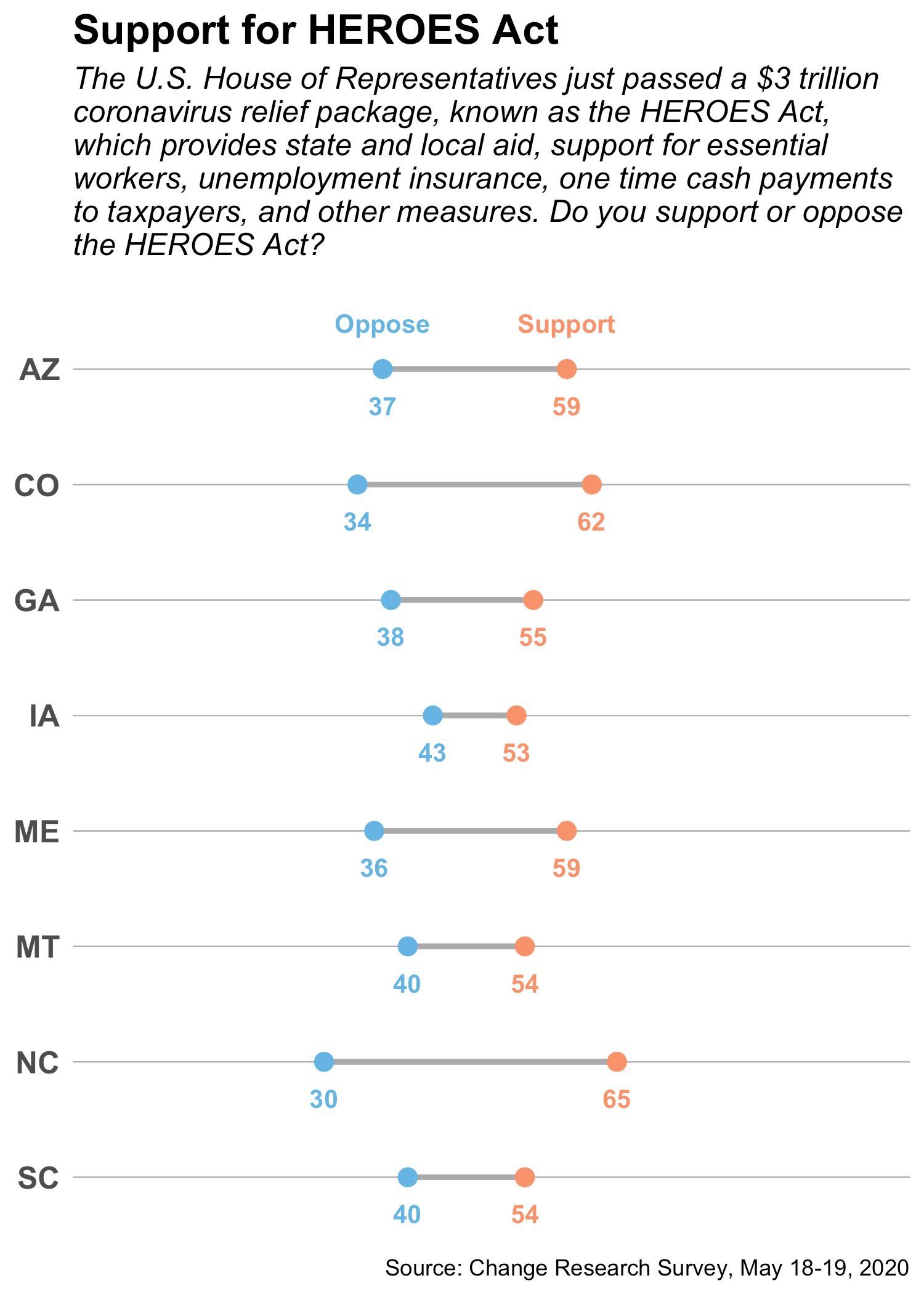
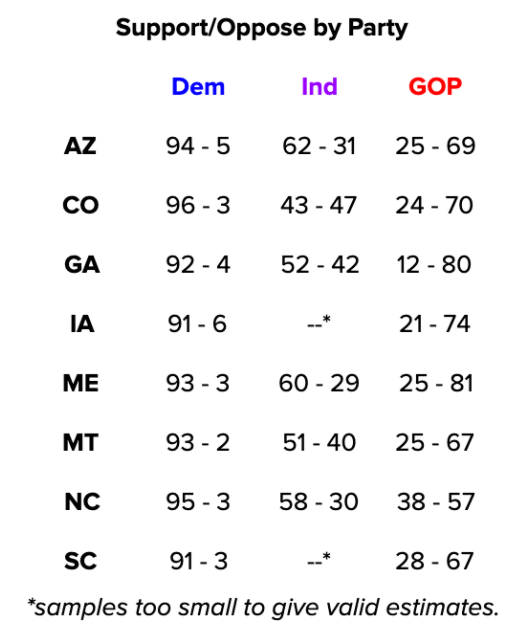
Voters across Senate battleground states also report that they are more likely to vote for an elected official who supports the HEROES Act. Democrats and Independents in all 8 states report being more likely to vote for someone who supported the HEROES Act.
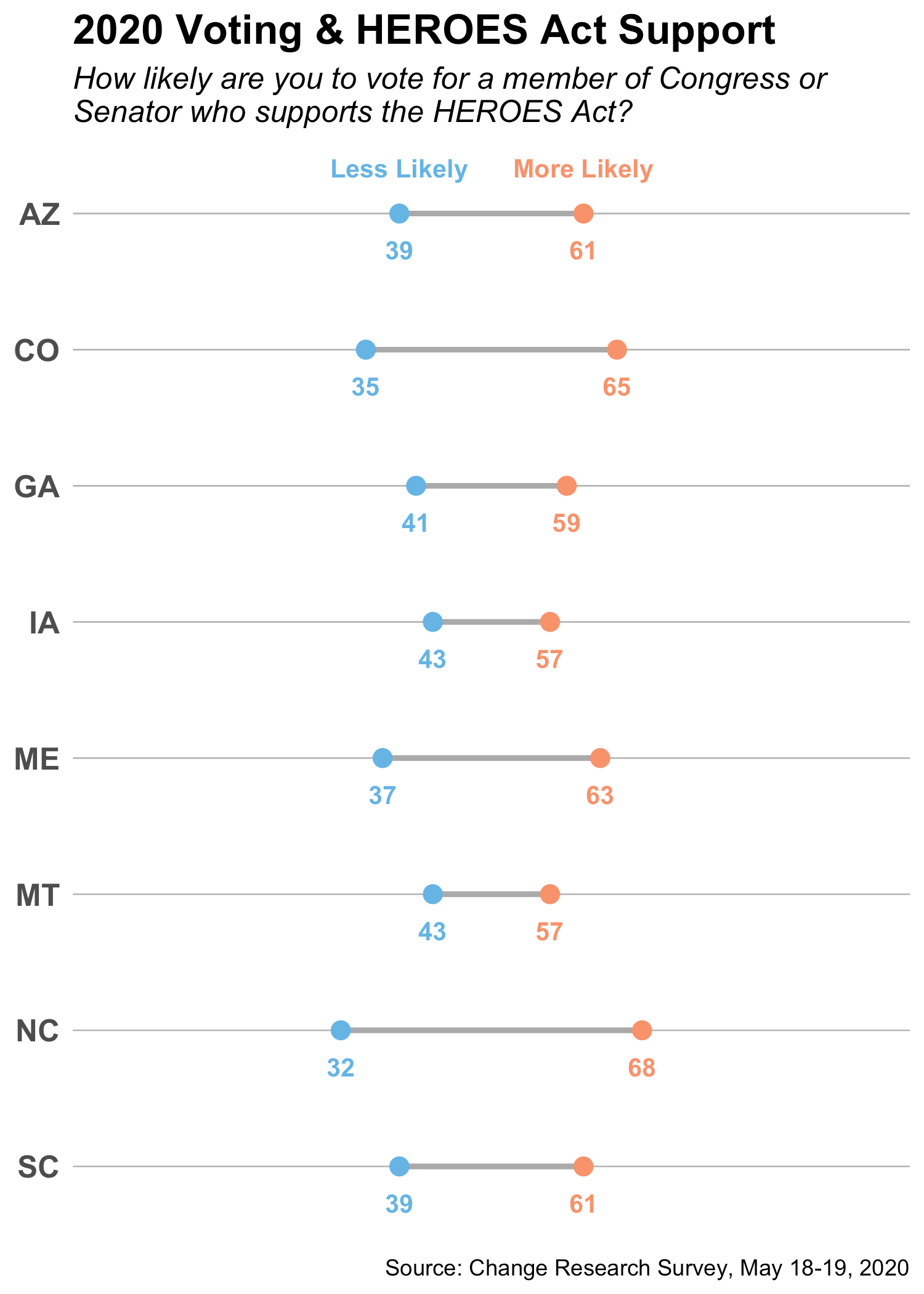
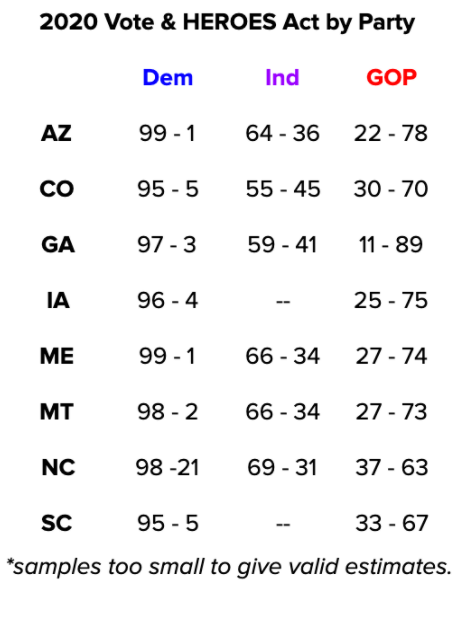
Voters express concern about fallout from budget cuts that the legislation seeks to remedy.
When we asked, “How concerned are you about the potential for budget cuts to programs that invest in the health, education, and safety of America’s children as a result of the likely recession and growing federal debt?”, the most common response was “extremely concerned” (38-51%). Most voters in these 8 states and districts (61-68%) support the proposed $1 trillion in aid to local governments to replace lost revenue, maintain public services, and avoid cutting jobs, and most voters in these 8 states (51-57%) want “a great deal of aid” allocated to nutritional programs to ensure children don’t go hungry.
On several measures, voters of color report 2-3 times as much concern about the economic impacts of the crisis as white voters. Some of the top concerns include paying the bills, the prospect of losing one’s savings, and the prospect of losing one’s health insurance.
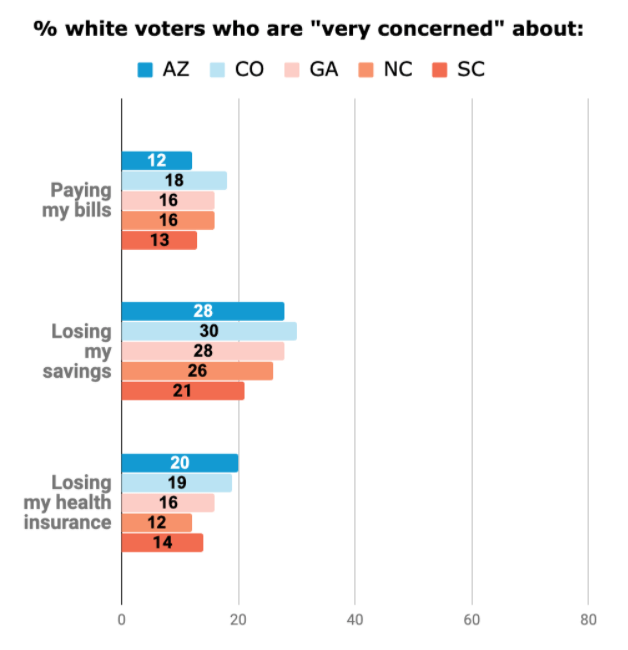
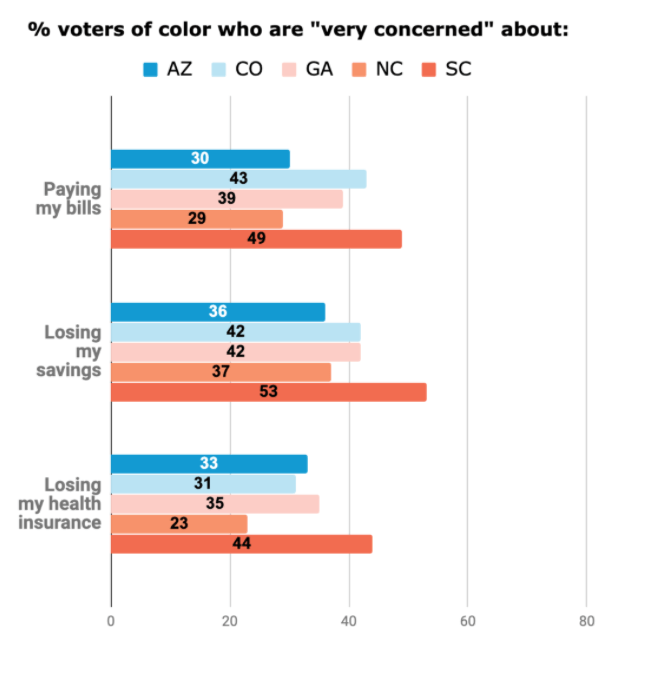
Provisions in HEROES Act
People, Not Corporations
Voters want government aid to go to people, not corporations. We asked voters how much government aid they thought should be devoted to various groups, and when it comes to large corporations, between 45-64% of voters across 8 Senate states and congressional districts believe that large corporations should receive no aid at all; another 24-36% of voters believe they should receive “a little bit of aid.” Only 8-20% of these voters believe large corporations should receive a moderate to great deal of aid. By contrast, 45-51% of these voters want to see “a great deal of aid” allocated to small business owners.
Aid to State & Local Governments
Voters want aid allocated to state and local governments for essential services, jobs, and schools. In Senate battlegrounds and congressional districts, 37-48% of voters want to see a “great deal of aid” allocated to schools and education; another 34-48% want to see “a great deal of aid” allocated to state and local governments to support essential services and avoid cutting jobs.
Student Loan Debt
Voters support pausing student loan debt payments but are less enthusiastic about loan forgiveness. 64-72% of Senate battleground voters and 75% of voters in frontline congressional districts support suspending student loan payments until September 2021 (37-49% strongly support). However, only 22-32% of these voters think “a great deal of aid” should go towards student debt relief. 44-59% support federal and private student loan forgiveness (29-39% strongly support).
Public Health
Voters broadly support allocating funds to public health initiatives. Senate battleground voters want to see “a great deal of aid” allocated to public health efforts including testing and treatment (46-59%) as well as to hospitals (38-49%). When we surveyed about specific components of the HEROES Act, we found that 62-69% of voters strongly support providing PPE for essential workers.
Voters want immigrants to be able to share in these public health resources. We tested various immigrant inclusion messages, and the one that garnered the most agreement emphasized the need to include everyone in public health efforts and resources, regardless of immigration status, and appealed to the need to keep everyone safe
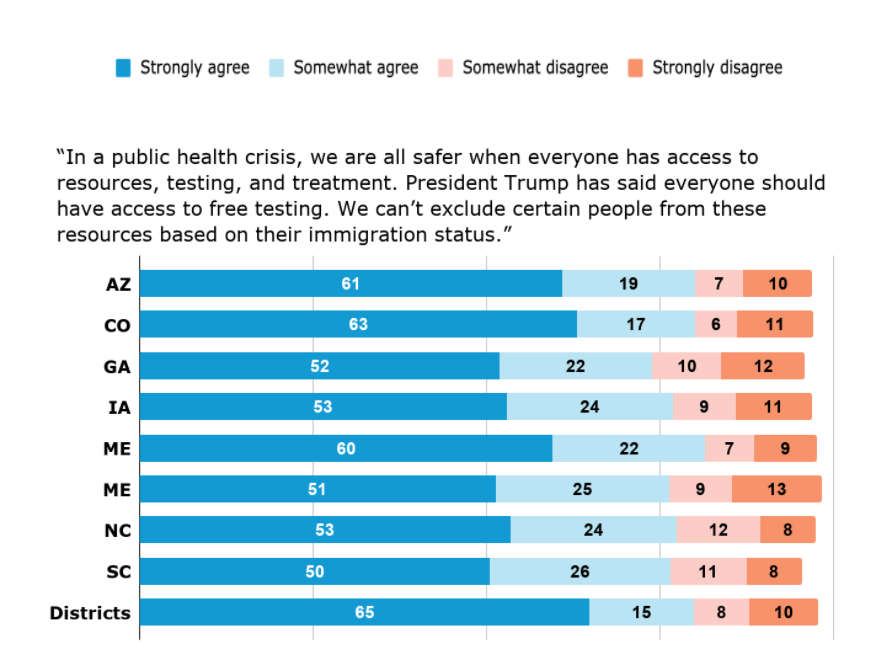
Essential Worker Benefits
Voters support funding and protection for essential workers. 42-54% want a “great deal of aid” allocated to essential workers, and 62-72% support the proposed $20 billion in hazard pay for essential workers (39-47% support this strongly). Further, a majority of voters want Congress to ensure that essential workers receive protections and benefits, both economic and health-wise. A strong majority of these voters (68-75%) also support paid sick and family medical leave for all workers
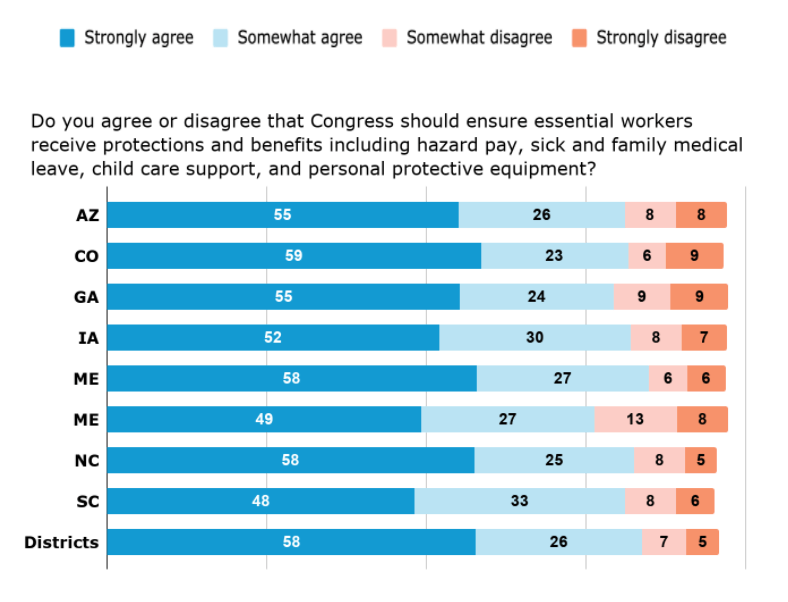
Immigrant Inclusion
In each state, a strong majority of voters support immigrant inclusion in the HEROES Act. Voters are very supportive of immigrant inclusion when it comes to making public health resources more universally accessible and ensuring DREAMers can continue to work and contribute during the crisis. Well over 50% in all 8 states and congressional districts agree that DACA recipients should be able to “keep working legally and contributing as frontline workers.” Voters also support immigrant inclusion economically for those who have permission to work and pay taxes.
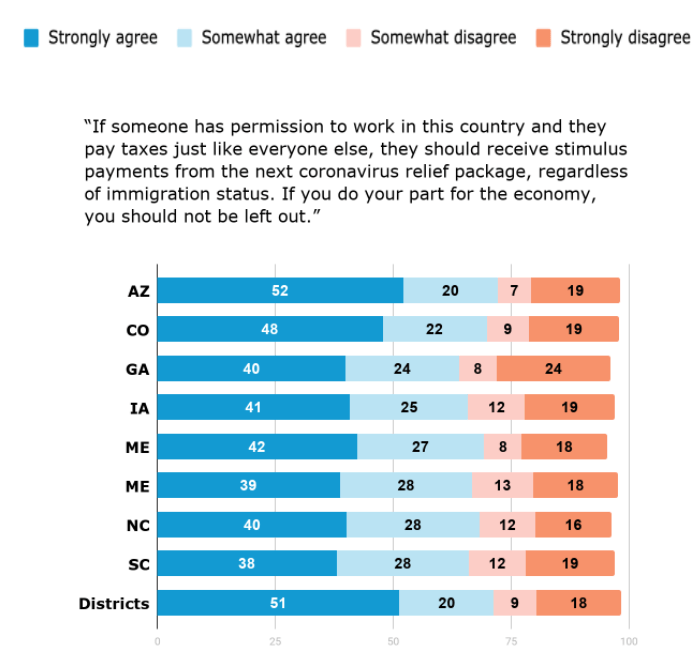
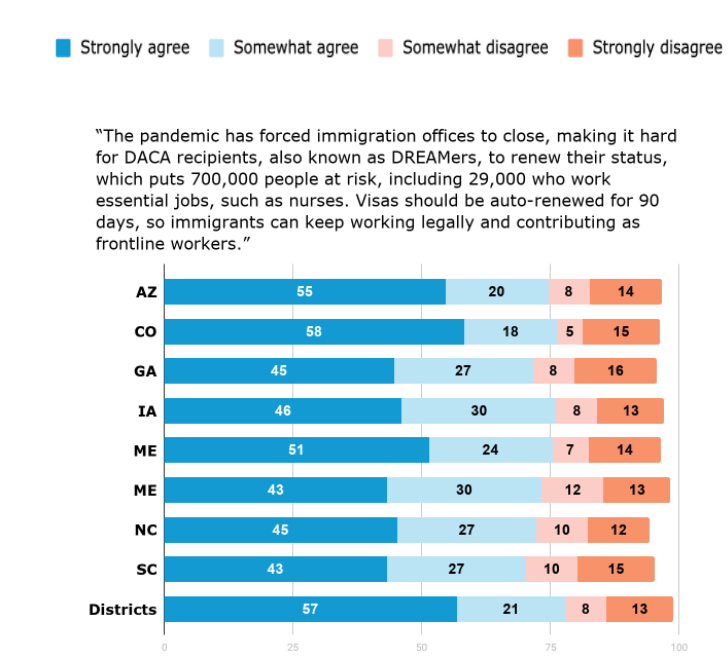
For media inquiries, please email [email protected]
Using its Dynamic Online Sampling Engine to attain a sample reflective of the electorate, Change Research polled 4,116 people from May 18-19, 2020 in 8 Senate swing states (AZ, CO, GA, IA, ME, MT, NC, SC) and 1,110 people from May 18-20, 2020 in 42 frontline congressional districts. The margin of error as traditionally calculated ranges from 3.6 % to 4.2 % depending on the state and 2.5 for the congressional district sample. Post-stratification weighting was performed on age, gender, race/ethnicity, education, region, and 2016 presidential vote. Weighting parameters were based on voter file data, and 2016 presidential results were based on numbers released by the Secretaries of State.
